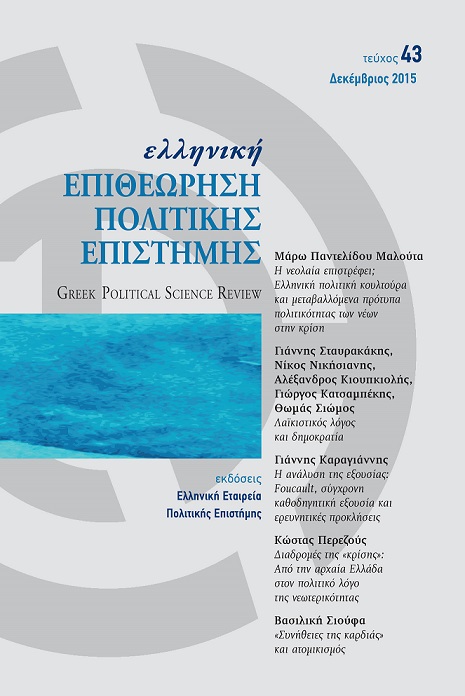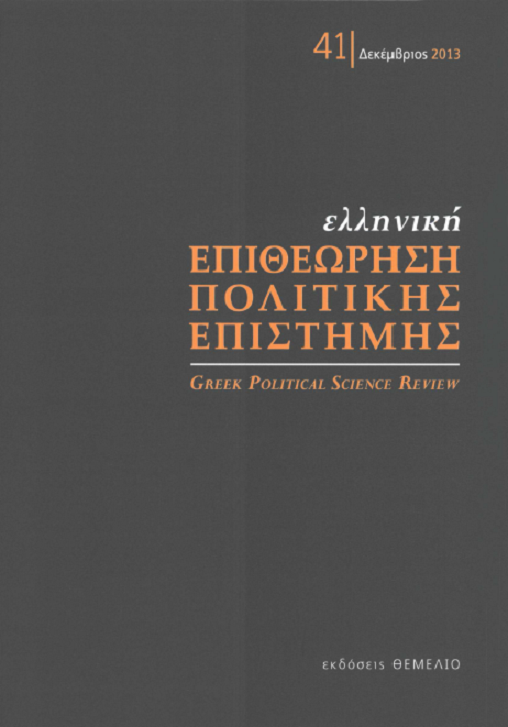Η νεολαία επιστρέφει; Ελληνική πολιτική κουλτούρα και μεταβαλλόμενα πρότυπα πολιτικότητας των νέων στην κρίση
Abstract
Στο άρθρο αυτό υποστηρίζεται η ισχυρή ανακοινωνικοποιητική επίδραση της κρίσης στην πολιτικότητα των νέων, με βάση εμπειρικά δεδομένα από κοινωνικές έρευνες και στοιχεία από μετρήσεις «μετά την κάλπη». Πολλαπλές ενδείξεις τεκμηριώνουν την υπόθεση περί σημαντικών αλλαγών στην πολιτικότητα της νεολαίας στο πλαίσιο της ελληνικής πολιτικής κουλτούρας, αλλαγών που επιτρέπουν την υπόθεση ότι νέες και νέοι εκδηλώνουν τάσεις «επιστροφής στην πολιτική». Μια επιστροφή όμως που γίνεται σταδιακά, πρώτα αδιαμεσολάβητα με αμεσοδημοκρατικές, μη συμβατικές παρεμβάσεις, και μόνο στη συνέχεια μέσω των καθιερωμένων δομών του κοινοβουλευτισμού. Αλλά διστακτικά και με χαμηλή αίσθηση «κομματικής εγγύτητας», παρά τη σαφή στροφή προς την Αριστερά. Έτσι καταγράφονται νέες τάσεις στην ελληνική πολιτική κουλτούρα, που στην πρώτη φάση της κρίσης συμβάλλουν στην αμφισβήτηση μιας ακόμη πολιτολογικής ορθοδοξίας, αυτής που αναφέρεται στην «πυραμίδα της συμμετοχής», ενώ στη δεύτερη, ακυρώνουν την εικόνα της πολιτικά
Article Details
- Come citare
-
Παντελίδου Μαλούτα Μ. (2017). Η νεολαία επιστρέφει; Ελληνική πολιτική κουλτούρα και μεταβαλλόμενα πρότυπα πολιτικότητας των νέων στην κρίση. Ελληνική Επιθεώρηση Πολιτικής Επιστήμης, 43, 5–46. https://doi.org/10.12681/hpsa.14404
- Fascicolo
- V. 43 (2015)
- Sezione
- Άρθρα

Questo lavoro è fornito con la licenza Creative Commons Attribuzione - Non commerciale - Condividi allo stesso modo 4.0 Internazionale.
Οι συγγραφείς θα πρέπει να είναι σύμφωνοι με τα παρακάτω: Οι συγγραφείς των άρθρων που δημοσιεύονται στο περιοδικό διατηρούν τα δικαιώματα πνευματικής ιδιοκτησίας επί των άρθρων τους, δίνοντας στο περιοδικό το δικαίωμα της πρώτης δημοσίευσης. Άρθρα που δημοσιεύονται στο περιοδικό διατίθενται με άδεια Creative Commons 4.0 και σύμφωνα με την οποία μπορούν να χρησιμοποιούνται ελεύθερα, με αναφορά στο/στη συγγραφέα και στην πρώτη δημοσίευση για μη κερδοσκοπικούς σκοπούς και με δικαίωμα τροποποίησης μόνο με παρόμοια διανομή (αν αναμείξετε, τροποποιήσετε, ή δημιουργήσετε πάνω στο υλικό, πρέπει να διανείμετε τις δικές σας συνεισφορές υπό την ίδια άδεια όπως και το πρωτότυπο).



